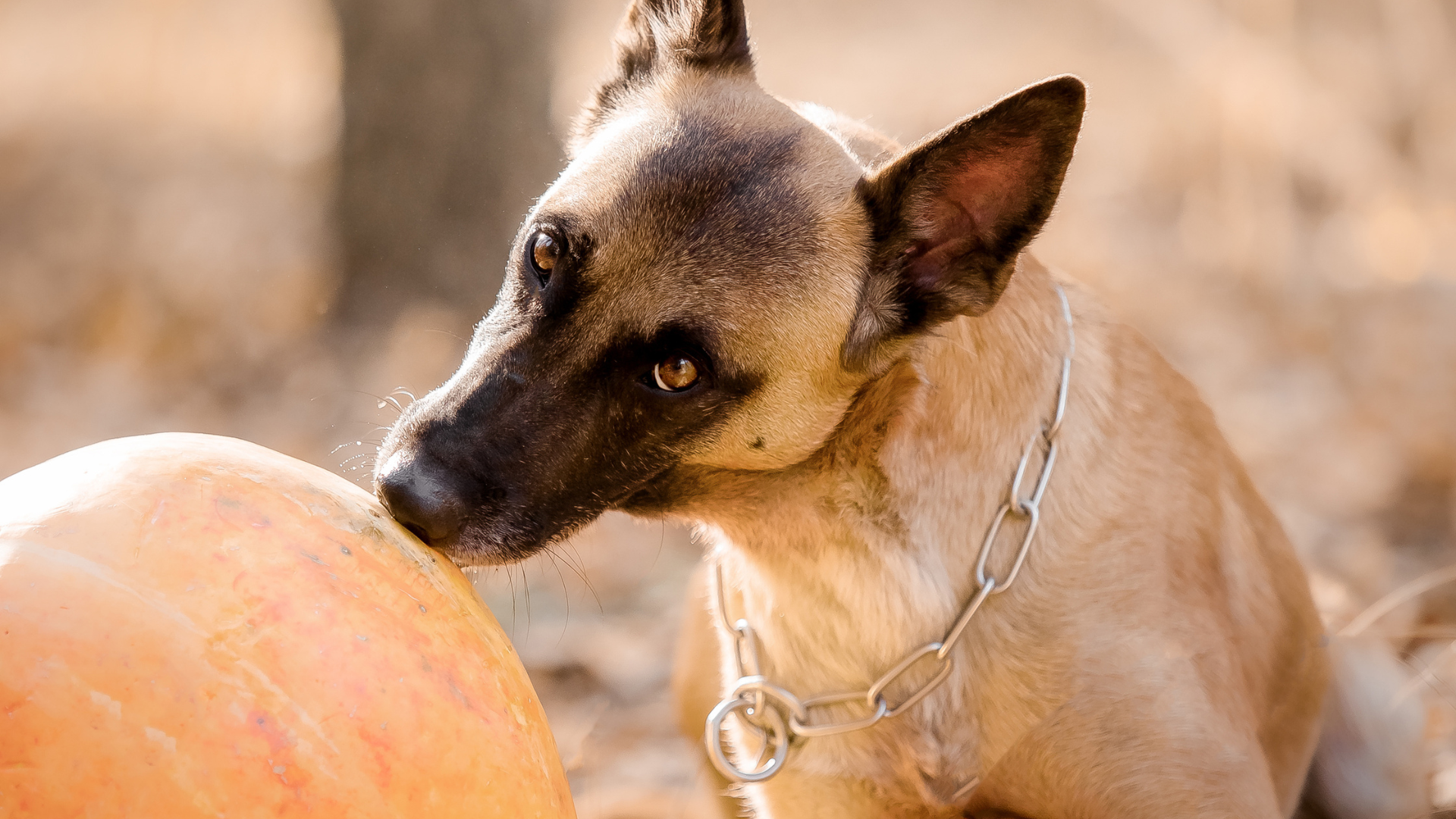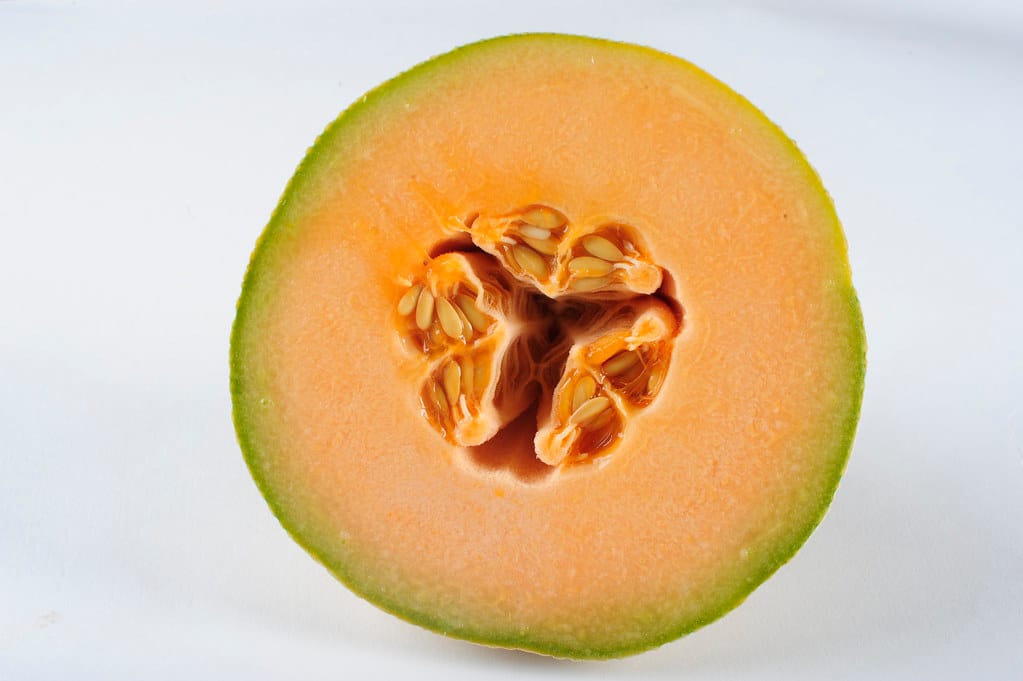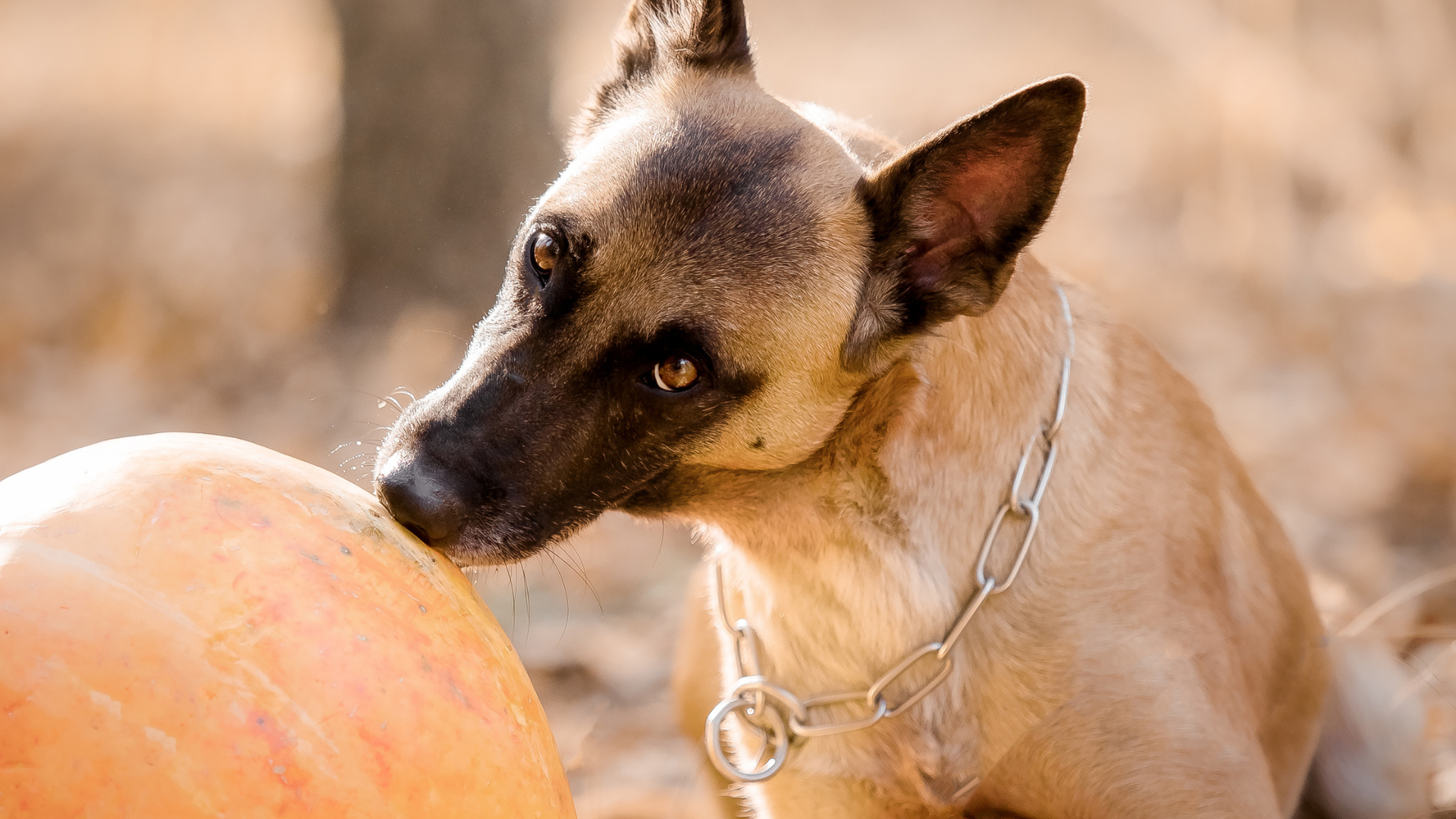Cantaloupe is a refreshing and nutritious fruit that is enjoyed by many people. It is rich in vitamins A and C, as well as potassium and fiber. However, if you are a dog owner, you may be wondering if it is safe to share this fruit with your furry friend. Specifically, can dogs eat cantaloupe rinds?

The short answer is no, dogs should not eat cantaloupe rinds. While the flesh of the fruit is safe for dogs to consume in moderation, the rind can be difficult for them to digest and may cause gastrointestinal upset. Additionally, the rind can pose a choking hazard or cause an obstruction in a dog's digestive system. It is important to always supervise your dog when feeding them any human food, including cantaloupe.
If you are looking to share a healthy snack with your dog, there are plenty of other fruits and vegetables that are safe and beneficial for them to eat. Carrots, blueberries, and apples are just a few examples of dog-friendly produce. As always, it is best to consult with your veterinarian before introducing any new foods to your dog's diet.

Can Dogs Eat Cantaloupe?
Cantaloupe is a delicious and refreshing fruit that many people enjoy during the summer months. But what about dogs? Can they eat cantaloupe? The answer is yes, dogs can safely eat cantaloupe in moderation. However, there are some important things to keep in mind before giving your furry friend this treat.
Health Benefits of Cantaloupe for Dogs
Cantaloupe is a great source of vitamins and nutrients that can benefit your dog's health. It is rich in vitamin A, which is essential for good vision, and vitamin C, which helps boost the immune system. Cantaloupe also contains fiber, which can aid in digestion, and antioxidants, which can help protect against disease. Additionally, cantaloupe is a hydrating fruit that can help keep your dog's body hydrated.
Risks and Considerations
While cantaloupe can be a healthy treat for dogs, there are some risks and considerations to keep in mind. Cantaloupe has a high sugar content and can be high in calories, so it should be given in moderation. Dogs that are overweight or have diabetes should not be given cantaloupe without first consulting with a veterinarian.
Cantaloupe can also cause gastrointestinal upset in some dogs, leading to vomiting or diarrhea. The rind and seeds of the cantaloupe can be a choking hazard and can cause intestinal blockage if ingested. The rind is also tough and difficult to digest, so it is best to remove it before feeding cantaloupe to your dog.
Cantaloupe Rind and Seeds
The rind and seeds of the cantaloupe are not toxic to dogs, but they can be a choking hazard and can cause intestinal blockage if ingested. It is best to remove the rind and seeds before feeding cantaloupe to your dog. If you want to give your dog a chew toy, there are safer options available.
Safe Serving Suggestions
When giving your dog cantaloupe, it is important to do so in moderation. Cantaloupe should be given as a treat and not as a substitute for a balanced diet. It is best to cut the cantaloupe into bite-sized pieces or puree it before feeding it to your dog. You can also freeze cantaloupe for a refreshing summer treat. Before feeding cantaloupe to your dog, make sure to wash it thoroughly to remove any dirt or pesticides.

Nutritional Aspects of Cantaloupe
Cantaloupe is a nutritious fruit that is low in calories and high in vitamins and minerals. This juicy fruit is a great source of hydration and fiber, making it a healthy snack option for both humans and dogs. In this section, we will explore the nutritional aspects of cantaloupe and its suitability for dogs.
Vitamins and Minerals in Cantaloupe
Cantaloupe is rich in vitamins and minerals that are essential for good health. It is an excellent source of vitamin A, which is important for maintaining healthy eyesight, skin, and immune function. It also contains significant amounts of potassium, magnesium, niacin, folate, and selenium. Additionally, cantaloupe is a good source of vitamin K, which is essential for blood clotting and bone health.
Hydration and Fiber Content
Cantaloupe has a high water content, which makes it a great source of hydration. It also contains dietary fiber, which is important for maintaining healthy digestion and preventing constipation. The fiber in cantaloupe can also help regulate blood sugar levels and reduce the risk of heart disease.
Sugar and Caloric Considerations
Cantaloupe is a low-calorie fruit that is naturally sweet. While it does contain sugar, the sugar content is relatively low compared to other fruits. This makes it a great option for people and dogs who are watching their sugar and calorie intake. However, it is important to remember that too much of any food can lead to weight gain, so it should be consumed in moderation.
Cantaloupe Compared to Other Fruits
When compared to other fruits, cantaloupe is a great source of vitamins, minerals, and hydration. It has a similar nutrient profile to watermelon, but with less sugar. Bananas, apples, blueberries, grapes, cucumbers, avocado, and cherries are also nutritious fruits that can be included in a healthy diet.
Feeding Dogs a Balanced Diet
While cantaloupe can be a nutritious snack for dogs, it should not be the primary source of their diet. Dogs require a balanced diet that includes protein, fat, and carbohydrates in the right proportions. Cantaloupe can be given to dogs as a treat, but it should not make up a significant portion of their diet. It is important to consult with a veterinarian before making any changes to your dog's diet.
Potential Health Issues
Cantaloupes are a healthy and nutritious snack for humans, but are they safe for dogs to eat? The flesh of a cantaloupe is safe for dogs to consume in moderation, but what about the rind? In this section, we will explore the potential health issues that may arise if dogs eat cantaloupe rinds.
Digestive System Concerns
Dogs have a different digestive system than humans, and cantaloupe rinds can be difficult for them to digest. Eating large amounts of rind may cause gastrointestinal upset, including diarrhea and vomiting. Additionally, the tough and fibrous texture of the rind can cause constipation in some dogs.
Allergic Reactions and Toxicity
While cantaloupe is not toxic to dogs, some dogs may be allergic to it. Signs of an allergic reaction may include itching, swelling, and difficulty breathing. It is important to monitor your dog closely after feeding them cantaloupe, especially if it is their first time trying it.
Weight Management and Obesity
Cantaloupe rinds are high in calories and sugar, which can contribute to weight gain and obesity in dogs. Overweight dogs are at a higher risk for developing diabetes and other diseases. It is recommended to only feed your dog small amounts of cantaloupe flesh as a treat, and avoid feeding them the rind altogether.
Pre-existing Conditions and Cantaloupe
If your dog has pre-existing health conditions, such as diabetes, it is important to consult with your veterinarian before feeding them cantaloupe. The high sugar content in cantaloupe can cause a spike in blood sugar levels, which can be dangerous for diabetic dogs.
In conclusion, while cantaloupe rinds are not toxic to dogs, they can cause digestive issues and contribute to weight gain if consumed in large amounts. It is recommended to only feed your dog small amounts of cantaloupe flesh as a treat, and avoid feeding them the rind altogether. If you have any concerns about feeding your dog cantaloupe, consult with your veterinarian for personalized advice.

Consulting a Veterinarian
Feeding cantaloupe to dogs can be a healthy treat, but it is important to consult a veterinarian before doing so. A veterinarian can provide professional veterinary help and advice on the risks and benefits of feeding cantaloupe to dogs.
When to Seek Professional Help
If a dog is experiencing symptoms such as blockage or choking, it is important to seek professional veterinary help immediately. Ingesting cantaloupe seeds or rind can pose a choking hazard or cause blockage in a dog's digestive system.
Routine Dietary Consultations
Consulting a veterinarian for routine dietary consultations is also important for a dog's overall health. A vet can provide advice on the appropriate diet and foods for a dog, including treats like cantaloupe.
Specific Concerns for Feeding Cantaloupe
When feeding cantaloupe to dogs, it is important to remove the rind and seeds, as they can pose choking hazards or cause blockage. Additionally, cantaloupe should be fed in moderation as too much can cause digestive upset.
In summary, consulting a veterinarian is crucial for the health and well-being of a dog. When feeding cantaloupe, it is important to be aware of the potential risks and to remove the rind and seeds before feeding in moderation.

Conclusion
In conclusion, dogs can eat cantaloupe rinds, but it is not recommended. While cantaloupe rinds are not toxic to dogs, they are difficult to digest and may cause gastrointestinal issues. It is important to note that dogs should only be given cantaloupe in moderation, as too much of it can lead to an upset stomach.
Cantaloupe is a great source of vitamins and minerals, including vitamin A, vitamin C, and potassium. However, it is important to remove the seeds and rind before giving cantaloupe to your dog. The seeds can pose a choking hazard, while the rind can be difficult to digest.
If you do decide to give your dog cantaloupe, it is important to do so in moderation. Too much cantaloupe can lead to an upset stomach and diarrhea. It is also important to monitor your dog for any signs of an allergic reaction, such as itching, swelling, or difficulty breathing.
Overall, while cantaloupe can provide health benefits for dogs, it is important to give it to them in a safe and responsible manner. It is best to stick to feeding your dog cantaloupe flesh, and avoid giving them the rind or seeds.
Frequently Asked Questions
- What are the potential risks of feeding cantaloupe rinds to dogs?
- Cantaloupe rinds are not toxic to dogs, but they can be difficult for dogs to digest. If a dog eats too much rind, it can cause gastrointestinal upset, including vomiting and diarrhea. The rind can also cause an intestinal blockage in some cases.
- Are there any benefits to giving dogs cantaloupe rinds?
- Cantaloupe rinds are a good source of fiber and nutrients, including vitamins A and C. However, dogs can get these nutrients from other sources, such as fruits and vegetables that are easier for them to digest.
- How should cantaloupe rinds be prepared for safe canine consumption?
- Before giving cantaloupe rinds to a dog, it is important to remove the skin and any seeds. The rind should be cut into small, bite-sized pieces to make it easier for the dog to chew and digest. It is also important to wash the rind thoroughly to remove any dirt or pesticides.
- Can the seeds in cantaloupe rinds cause harm to dogs?
- Cantaloupe seeds are not toxic to dogs, but they can be a choking hazard and can cause an intestinal blockage if swallowed. It is important to remove all seeds from the rind before giving it to a dog.
- What is the appropriate serving size of cantaloupe rinds for dogs?
- The appropriate serving size of cantaloupe rind for a dog depends on the size of the dog. As a general rule, a small dog should be given no more than a few small pieces of rind, while a larger dog can be given a few larger pieces. It is important to monitor the dog for any signs of gastrointestinal upset after giving them cantaloupe rind.
- Are there any specific dog breeds that should avoid cantaloupe rinds?
- There are no specific dog breeds that should avoid cantaloupe rinds, but dogs with sensitive stomachs or digestive issues may have trouble digesting them. It is important to introduce cantaloupe rinds slowly and in small amounts to see how the dog reacts. If the dog experiences any gastrointestinal upset, it is best to avoid giving them cantaloupe rind in the future.




